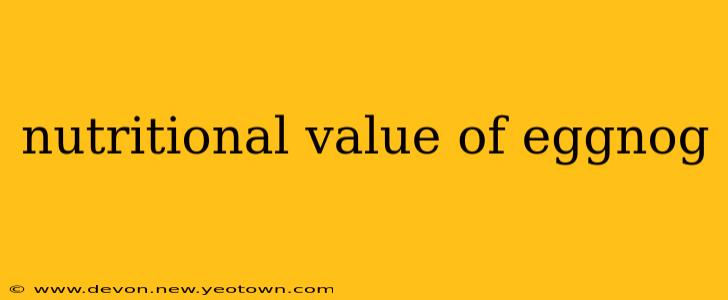Eggnog. The very word conjures images of cozy nights by the fire, festive gatherings, and a creamy, spiced indulgence. But beyond the delicious taste, what's the nutritional value of this holiday classic? Let's delve into the surprising nutritional profile of eggnog, separating fact from festive fiction.
What are the main ingredients in eggnog, and how do they contribute to its nutritional value?
Traditional eggnog boasts a surprisingly rich nutritional profile thanks to its core ingredients: milk or cream, eggs, and sugar. Let's break it down:
-
Milk/Cream: These provide a significant source of calcium, essential for strong bones and teeth. They also contribute to the eggnog's creamy texture and offer some protein and vitamin D. The fat content, of course, varies depending on whether you use whole milk, 2%, or cream.
-
Eggs: Eggs are nutritional powerhouses, packed with protein, vitamins (like A, D, and B12), and minerals. The yolks, in particular, contribute to the richness and contain crucial nutrients.
-
Sugar: This is where the nutritional profile takes a turn. While sugar adds sweetness and enhances the overall taste, it's a source of empty calories and can contribute to weight gain if consumed in excess. Many recipes also include spices like nutmeg, cinnamon, and cloves, which offer antioxidant benefits but contribute minimal calories.
Is eggnog a good source of protein?
Yes, eggnog can be a decent source of protein, primarily thanks to the eggs and milk/cream. However, the amount of protein varies depending on the specific recipe and the proportions of each ingredient. A serving of homemade eggnog might offer around 5-8 grams of protein, while commercially prepared versions can vary. Keep in mind that protein needs differ based on individual factors like age, activity level, and overall health goals.
How many calories are in a typical serving of eggnog?
This is a crucial question, and the answer varies greatly. A small serving (about ½ cup) of homemade eggnog can range from 150 to 300 calories, depending on the ingredients. Commercially produced eggnog often contains even more calories, sometimes exceeding 400 calories per serving, largely due to added sugar and cream. Therefore, moderation is key when enjoying this festive treat.
Is eggnog fattening?
Eggnog's calorie and fat content are significant factors in whether it's considered "fattening." The high fat and sugar content can certainly contribute to weight gain if consumed regularly and in large quantities. However, a small, occasional serving as part of a balanced diet is unlikely to have a significant impact on weight. The key is portion control and mindful consumption.
Does eggnog contain any vitamins and minerals?
Yes, eggnog offers some vitamins and minerals, mostly derived from the milk and eggs. These include calcium, vitamin D, vitamin A, riboflavin, and some B vitamins. However, the amounts may not be substantial enough to significantly impact your daily nutrient intake. It’s best to rely on a balanced diet for your essential vitamins and minerals rather than solely on eggnog.
Is it healthier to make eggnog at home or buy it pre-made?
Making eggnog at home offers greater control over the ingredients, allowing you to reduce the sugar content and use healthier alternatives like skim milk or less cream. This can significantly lower the calorie and fat content compared to commercially prepared versions, which often contain added sugars and preservatives.
In conclusion, eggnog, while undeniably delicious, is a treat best enjoyed in moderation. Its nutritional value is a mix of beneficial nutrients from eggs and dairy, balanced against the potentially negative impact of added sugars. By making informed choices about ingredients and portion sizes, you can enjoy this festive beverage without compromising your health. Remember, everything in moderation!

